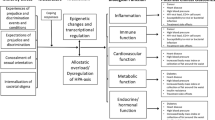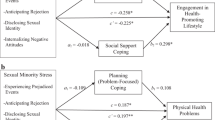Abstract
This study examined the effects of minority stress on the physical health of lesbians, gay men, and bisexuals (LGBs). Participants (N = 396) completed baseline and one year follow-up interviews. Exposure to stress and health outcomes were assessed with two methods: a subjective self-appraisal method and a method whereby two independent judges externally rated event narratives using standardized criteria. The odds of experiencing a physical health problem at follow-up were significantly higher among LGBs who experienced an externally rated prejudice event during the follow-up period compared to those who did not. This association persisted after adjusting for experiences of general stressful life events that were not related to prejudice. Self-appraised minority stress exposures were not associated with poorer physical health at 1-year follow-up. Prejudice-related stressful life events have a unique deleterious impact on health that persists above and beyond the effect of stressful life events unrelated to prejudice.
Similar content being viewed by others
References
American Association for Public Opinion Research (AAPOR) (2005). Standard Definitions: Final Dispositions of Case Codes and Outcome Rates for Surveys.
Bowleg, L. (2008). When black + lesbian + woman ≠ black lesbian woman: The methodological challenges of qualitative and quantitative intersectionality research. Sex Roles, 59, 312–325.
Conron, K. J., Mimiaga, M. J., & Landers, S. J. (2010). A population-based study of sexual orientation identity and gender differences in adult health. American Journal of Public Health, 100, 1953–1960.
Dohrenwend, B. P. (2006). Inventorying stressful life events as risk factors for psychopathology: Toward resolution of the problem of intracategory variability. Psychological Bulletin, 132, 477–495.
Feldman Barret, L., & Swim, J. K. (1998). Appraisals of prejudice and discrimination. In J. K. Swim & C. Stangor (Eds.), Prejudice: The target’s perspective (pp. 11–36). San Diego: Academic Press.
Frost, D. M. (2011). Stigma and intimacy in same-sex relationships: A narrative approach. Journal of Family Psychology, 25, 1–10.
Frost, D. M., & Meyer, I. H. (2009). Internalized homophobia and relationship quality among lesbians, gay men, and bisexuals. Journal of Counseling Psychology, 56, 97–109.
Herek, G. M., Gillis, J. R., & Cogan, J. C. (1999). Psychological sequelae of hate-crime victimization among lesbian, gay, and bisexual adults. Journal of Consulting and Clinical Psychology, 67, 945–951.
Huebner, D. M., & Davis, M. C. (2007). Perceived antigay discrimination and physical health outcomes. Health Psychology, 26, 627–634.
Idler, E. L., & Benyamini, Y. (1997). Self-rated health and mortality: a review of twenty-seven community studies. Journal of Health and Social Behavior, 38, 21–37.
Institute of Medicine. (2011). The health of lesbian, gay, bisexual, and transgender people: Building a foundation for better understanding. Washington: The National Academies Press.
Lehavot, K., Walters, K. L., & Simoni, J. M. (2009). Abuse, mastery, and health among lesbian, bisexual, and two-spirit American Indian and Alaska Native women. Cultural Diversity and Ethnic Minority Psychology, 15, 275–284.
Link, B. G. (1987). Understanding labeling effects in the area of mental disorders: An assessment of the effects of expectations of rejection. American Sociological Review, 52, 96–112.
Major, B., Kaiser, C. R., & McCoy, S. K. (2003). It’s not my fault: When and why attributions to prejudice protect self-esteem. Personality and Social Psychology Bulletin, 29, 772–781.
Meyer, I. H. (2003a). Prejudice, social stress, and mental health in lesbian, gay, and bisexual populations: Conceptual issues and research evidence. Psychological Bulletin, 129, 674–697.
Meyer, I. H. (2003b). Prejudice as stress: Conceptual and measurement problems. American Journal of Public Health, 93, 262–265.
Meyer, I. H., & Dean, L. (1998). Internalized homophobia, intimacy, and sexual behavior among gay and bisexual men. In G. M. Herek (Ed.), Stigma and sexual orientation: Understanding prejudice against lesbians, gay men, and bisexuals (pp. 160–186). Thousand Oaks: Sage Publications.
Meyer, I., Rossano, L., Ellis, J., & Bradford, J. (2002). A brief telephone interview to identify lesbian and bisexual women in random digit dialing sampling. Journal of Sex Research, 39(2), 139–144.
Meyer, I. H., Schwartz, S., & Frost, D. M. (2008). Social patterning of stress and coping: Does disadvantaged social statuses confer more stress and fewer coping resources? Social Science and Medicine, 67(3), 368–379.
Pantalone, D. W., Hessler, D. M., & Simoni, J. M. (2010). Mental health pathways from interpersonal violence to health-related outcomes in HIV-positive sexual minority men. Journal of Consulting and Clinical Psychology, 78(3), 387–397.
Sandfort, T. G. M., Bakker, F., Schellevis, F. G., & Vanwesenbeeck, I. (2006). Sexual orientation and mental and physical health status: findings from a Dutch population survey. American Journal of Public Health, 96, 1119–1125.
Schwartz, S., & Meyer, I. H. (2010). Mental health disparities research: The impact of within and between group analyses on tests of social stress hypotheses. Social Science and Medicine, 70, 1111–1118.
Stewart, A. J., & McDermott, C. (2004). Gender in psychology. Annual Review of Psychology, 55, 519–544.
Thoits, P. A. (2010). Stress and health: major findings and policy implications. Journal of Health and Social Behavior, 51(Suppl), S41–S53.
Ware, J, Jr, Kosinski, M., & Keller, S. D. (1996). A 12-item short-form health survey: Construction of scales and preliminary tests of reliability and validity. Medical Care, 34, 220–233.
Williams, D. R., Yu, Y., Jackson, J. S., & Anderson, N. B. (1997). Racial differences in physical and mental health: Socio-economic status, stress and discrimination. Journal of Health Psychology, 2, 335–351.
Author information
Authors and Affiliations
Corresponding author
Rights and permissions
About this article
Cite this article
Frost, D.M., Lehavot, K. & Meyer, I.H. Minority stress and physical health among sexual minority individuals. J Behav Med 38, 1–8 (2015). https://doi.org/10.1007/s10865-013-9523-8
Received:
Accepted:
Published:
Issue Date:
DOI: https://doi.org/10.1007/s10865-013-9523-8




